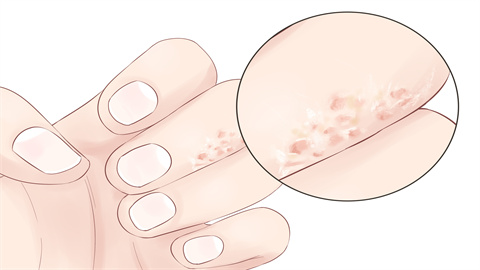What should I do if transparent small blisters appear on my fingertips and they itch a lot?
Generally, transparent small blisters on the fingers that cause itching may be caused by environmental factors, genetic factors, dyshidrotic eczema, contact dermatitis, urticaria, and other reasons. General treatment and medication can be used to improve the condition. It is important to seek medical attention promptly and follow the doctor's instructions for treatment. The specific details are as follows:

1. Environmental Factors: Environmental factors, especially hot and humid conditions, may lead to impaired perspiration, prolonged skin exposure to sweat, and subsequent inflammatory reactions on the skin, triggering dyshidrotic eczema. It is important to keep the skin on the hands dry and clean, avoiding prolonged contact with irritants.
2. Genetic Factors: Genetic factors play an important role in certain skin diseases, including eczema. Eczema is a chronic inflammatory skin disorder whose development is related to various factors such as genetic predisposition and immune abnormalities. When inflammatory factors stimulate surrounding tissues, they may induce itching and the formation of small blisters. Follow the doctor's instructions to use medications such as erythromycin ointment, tacrolimus ointment, and pimecrolimus cream to reduce inflammation and regulate the immune response.
3. Dyshidrotic Eczema: Dyshidrotic eczema is a specific type of eczema that commonly occurs in summer. It mainly results from impaired perspiration in hot and humid environments, leading to small blisters accompanied by intense itching. Under a doctor's guidance, medications such as loratadine tablets, urea ointment, and salicylic acid ointment can be used for itch relief and moisturizing treatment.
4. Contact Dermatitis: Contact dermatitis is an acute or chronic inflammatory skin disease occurring at the site of contact after the skin or mucous membranes come in single or repeated contact with allergens. When the skin is irritated or invaded by allergens, symptoms such as erythema, edema, and blisters may appear. Medications such as hydrocortisone cream, diphenhydramine tablets, and chlorpheniramine maleate tablets can be used under medical guidance to alleviate allergic reactions and itching.
5. Urticaria: Urticaria occurs when the body has an allergic reaction to certain substances, causing mast cells to release histamine and other inflammatory mediators, leading to vasodilation and edema, which result in itching, blisters, and generalized wheals. Under a doctor's guidance, medications such as calamine lotion, hydrocortisone butyrate cream, and cetirizine hydrochloride tablets can be used to relieve itching and reduce inflammation.
In daily life, keeping the skin on the hands dry and clean, and avoiding contact with allergens and irritants can help prevent and treat these conditions.







